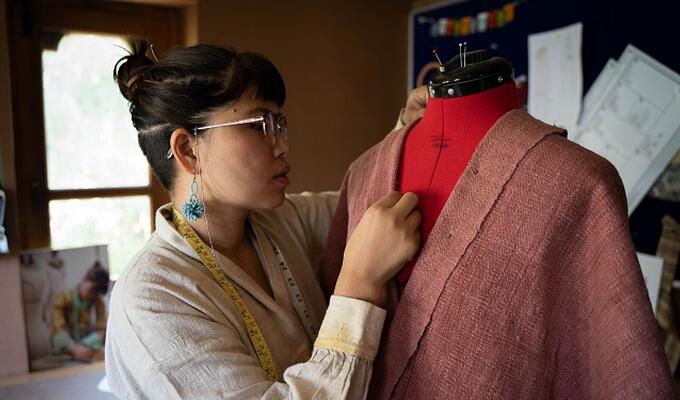
Making headway
United Nations is ‘Delivering as One’ to promote sustainable development in Bhutan
As this unpredictable year comes to an end, we are still braving a pandemic that has been incredibly challenging for us all. The most vulnerable sections of society, the poor, women and children in particular, have been the most affected and the crisis has created an economic impact that will only increase income inequalities around the world.
Given the scale of this global COVID-19 challenge, our world may need to go beyond simple categories of either optimism or pessimism. United Nations Bhutan is responding to the immediate needs of the people; the needs of the most vulnerable, while strengthening economic resilience and building long-term human capital so that we find new ways to ‘build back better’.
Building back better
In 2008, Bhutan adopted the ‘Delivering as One’ approach to improve collective performance, efficiency, accountability and results. This new approach strengthened the UN’s role at the heart of the multilateral system. Since then, the UN in Bhutan has delivered collaborative results through specialized resident UN agencies and in close coordination with other development partners in the country.
The Royal Government of Bhutan has embarked on developing the Economic Roadmap for the 21st Century to guide its development plans and programmes for a “High Income Gross National Happiness Society by 2030.” The Government invited the Development Partners Group, which I lead together with the UN Country Team, to craft this Roadmap, which includes the economic, social, environmental, and governance aspects of the Sustainable Development Goals.
Moreover, through the UN Framework for the Socio-Economic Response to COVID-19, the UN Country Team has been actively supporting the government. As trade, private-sector development and supporting micro, small and medium-sized enterprises are critical factors in this response, private-sector empowerment is at the core of our support to Bhutan.
ITC strengthens business
Exports in Bhutan are highly concentrated, with about 80% consisting of only 10 commodities, destined for the Indian market. The country also faces distinct constraints as a landlocked developing country, challenges that need to be addressed for Bhutan to graduate from least developed country status.
As part of the UN Country Team, the International Trade Centre (ITC) remains an active contributor towards Bhutan’s economic and trade growth. The UN agency is a long-term partner of the country, providing trade-related assistance, institutional strengthening, export competitiveness and trade facilitation.
Since 2018, with financial support from the European Union (EU), ITC has been implementing the EU-Bhutan Trade Support project. It brings the private sector and policymakers together to formulating and implementing trade policies and strengthening companies’ competitiveness. With this project, the UN, through ITC, supports the government’s commitment to developing trade and investment for sustainable economic growth and poverty reduction.
So far, the project has trained almost 400 farmers in organic production and post-harvest practices as well as stimulating increased exports of Bhutanese handicrafts to eight export markets in Europe.
During the pandemic, ITC supported farmers, small enterprises and exporters in the horticulture and handicraft sectors with quality control, marketing and production through a series of online training modules. The training enables suppliers to find international niche markets for their products, even during the recovery phase. The sessions focused on developing food security and hygiene measures in line with COVID-19 and Codex Alimentarius, so that small businesses can access new buyers in new markets. Women business owners for textile handicrafts established around 170 new contacts and received new orders from a range of international buyers. Through virtual coaching and mentoring sessions, the artisans can complete their orders despite challenging times.
Other successful examples of the project’s work are the Bhutan Trade Information Portal and the Agriculture Market Information System (AMIS), developed in collaboration with the Ministry of Agriculture and Forests. Businesses can see the latest global regulations and market access requirements for international trade on the Trade Information Portal e-platform. The platform also serves as information repository for local or foreign entrepreneurs and investors seeking partnerships with Bhutan. Further to this, AMIS gives access to real-time price information for Bhutanese farmers’ agricultural commodities, enabling them to get better prices and prosper.
Dealing with the aftermath of COVID-19 will require a strategic approach to attract sustainable investment. To encourage trade and investment in the long-term, ITC has prepared investment profiles and trained more than 200 public and private-sector representatives on international trade, policy regulations and investment promotion. Working with public and private sectors, in partnership with the Ministry of Economic Affairs and the Bhutan Chamber of Commerce and Industry, ITC integrates the voice of the private sector in policymaking and addresses critical aspects for business growth after COVID-19.
Working together brings success
Other UN Agencies in Bhutan, including the Food and Agriculture Organization (FAO) and the World Food Programme work alongside ITC on food safety and agricultural data. Partnerships such as these are vital for better development results.
All these efforts move us in the right direction, promoting partnership, collaboration and inclusion. Bhutan is making significant headway in its economic development, however, we have to help keep the momentum through stronger coordination between the UN, its agencies and our partners. We have to work together to innovate and encourage transformative development.
I consider it a privilege to be serving Bhutan at a time when we need to join hands with those who need our help the most.



